The blanket of caregiving, stitched with good intentions, often becomes a weight too heavy to bear. What starts as warmth becomes suffocation – each act of love simultaneously a thread of sacrifice that strains the weaver’s mental health.
As Kenya grapples with rising cases of chronic illnesses, a critical but often overlooked component of the healthcare system emerges – caregivers. These individuals, predominantly family members with no formal training, shoulder the immense burden of caring for loved ones with little institutional support or recognition. They provide emotional support, particularly to older parents, people with disabilities, and grandparents.
Julius Barasa, a psychologist at AMPATH, notes that in the majority of Kenyan families, the working and educated members often delegate caregiving to the less educated and jobless relatives, especially for chronic illnesses or long-term complications.
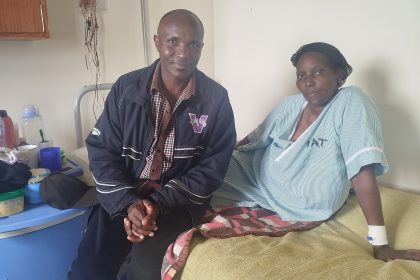
Read Also: From Spouses to Nurses: Kenya’s Invisible Army of Family Caregivers
Across Kenya, family members are stepping in as substitute nurses — giving injections, cleaning wounds, and sleeping on hospital floors to care for their loved ones. They’re unpaid, untrained, and emotionally exhausted.
Who cares for the caregivers?
Barasa, who is also managing a mental health programme at Moi Teaching and Referral Hospital (MTRH), told Willow Health that caregiving responsibilities often lead to strained relationships between patients and their caregivers and the latter with other family members.
Barasa cited scenarios where “Patients in pain would want to be immediately attended to in the hospital, but sometimes there are long queues that the caregiver can do little to bypass. Here, the patient feels the caregiver doesn’t care about their pain, while the caregiver feels the patient is unfairly blaming them on matters they have no control over.”
Caregivers in the shadows
Relationships get strained further when caregivers feel other family members are not doing enough to help.
Others think sending money solves everything, and though “Money is part of caregiving, physical presence has a larger impact on the patient,” adds Barasa. “It offers social and psychological support for patients.”
Despite frustration and friction between caregivers and patients, few caregivers abandon patients due to previous strong bonds, but “In a few instances, like mental illness, when the caregiver doesn’t know what to do, they can end up leaving the patient.”
Margaret Abukutsa says she was afraid her husband would abandon her when she was unable to conceive and was regularly unwell. [Photo by Michael Ollinga, Willow Health Media]
Read more: From Spouses to Nurses: Meet Kenya’s invisible army of family caregivers

Barasa calls for collective family responsibility to avoid burdening one person while allowing caregivers to debrief. He adds that support groups both in hospitals and community setups help ease mental distress when caregivers for patients with the same conditions open up and share experiences.
He called on medics to be considerate of caregivers’ shortcomings and compassionately give caregiving instructions in a simple language comprehensible to the care workers.
“In better healthcare systems, hospitals can extend care to the caregivers would help address mental distress issues. Limited resources at the moment have restrained focus on patients,” he divulged, adding that MTRH has established transitional homes where caregivers are empowered to continue caring for patients after their discharge to avoid relapses.
And the figures are telling: Of the 800,000 Kenyans who need palliative care annually, for instance, only 14,522 actually receive it, according to a 2023 BMC Palliative Care Study.
The study, which aligns with the Kenya Palliative Care Policy 2021-2030, attributes this growing need to high HIV prevalence and increasing cancer cases. Cancer incidence in Kenya rose from 37,000 in 2012 to 47,887 in 2018, making it the third leading cause of death in the country.
“The government and health sector stakeholders need to invest more in training caregivers and health workers to increase awareness and access to quality care,” argues David Musyoki, Executive Director of Kenya Hospices and Palliative Care Association (KEHPCA). “Family caregivers also need empowerment to offer better care and learn how to take care of themselves as they care for the sick.”
The invisible labour of women
The Kenya National Care Policy, published in August 2023 by the State Department for Gender and Affirmative Action, defines care work as “activities and relations involved in meeting the physical, psychological, and emotional needs of adults and children, old and young, frail and able-bodied.”
This policy acknowledges a stark reality: women perform 76% of all unpaid care work in Kenya, doing over three times the care work compared to men. A Kenyan survey cited in the policy indicates that women spend four to five hours daily on unpaid care work, while men spend only one hour.
This disparity creates significant barriers to women’s social, political, and economic empowerment, with unpaid care being a key factor determining whether women enter into or remain in employment and how well they perform professionally.
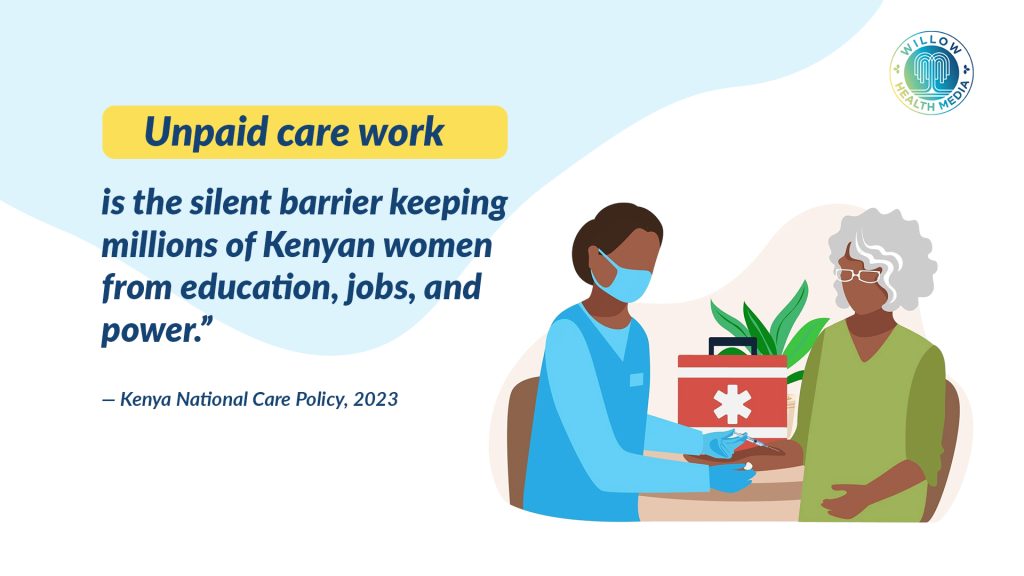
Kenya has several legal provisions that touch on caregiving, though they often lack specificity regarding care for the ill. Article 53 of the Constitution of Kenya 2010 states that all parents are responsible for caring for their children. Similarly, the National Policy on Older Persons and Ageing (2009, revised 2014) mandates quality and reasonable care for the elderly by both the family and the State.
However, there remains a significant gap in policies specifically addressing the needs and challenges of those caring for chronically ill family members. A study titled “Caring for Caregivers” recognises that women and girls constitute the majority of unpaid caregivers and recommends developing policies that recognise these caregivers within Kenya’s healthcare system to address their specific needs.
Barasa argues that those delegated caregiving roles are often “less educated and unemployed who in some communities are mostly women, thus hindering their growth as it becomes one’s full-time job.”
Family caregiving, however, is often more intensive, long-lasting, and complex than caregivers are prepared for, negatively affecting their health and well-being. Caregiving roles expose individuals to psychological effects and place them at high risk for depression.
Being in the hospital for long “causes mental distress. It’s more difficult when a patient is not improving despite a caregiver’s input or when the prognosis indicates the illness will not go away,” explains Barasa.
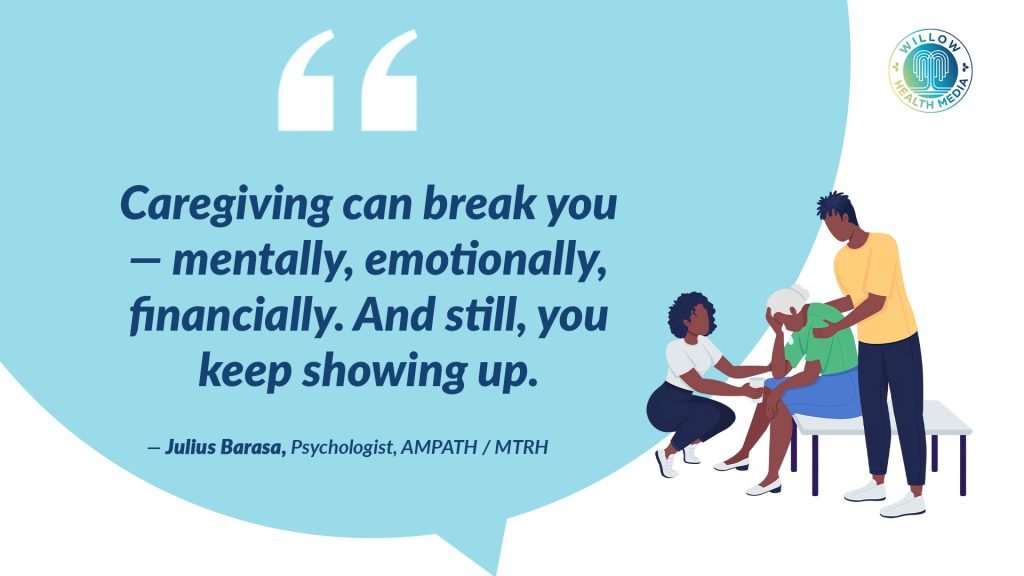
Unlike in countries with more developed healthcare systems, caregivers in Kenya and other low-income countries often have to quickly adjust to caring for sick relatives with minimal training and support, as they cannot afford professional care services.
Other nations, other options
In addressing caregiving challenges, Kenya can draw valuable lessons from other African nations that have made progress in this area. According to a 2021 study by Akosua Agyemang, only three middle-income economies in Africa – Seychelles, Mauritius, and South Africa.
Mauritius stands out with its National Integrated Care for Older People (ICOPE) Strategic and Action Plan (2023-2026), launched with WHO support. This initiative emphasises a person-centred approach that integrates health and social care for older people within primary healthcare. Through this approach, the government raises awareness of health issues, conducts early screening for physical and mental impairments, and makes appropriate referrals to reach at least 260,000 older persons.
Seychelles has established a Home Care Agency (HCA) that manages and regulates care services. This agency registers all caregivers and care recipients, vets potential caregivers, ensures services meet established requirements, facilitates training, and helps resolve issues between caregivers and care recipients. The establishment of HCA has been a relief to families who previously struggled to find qualified caregivers for their elderly and sick relatives.
In South Africa, the Department of Health provides and manages home-based care services through a district-based public healthcare model. The country has well-established, accredited agencies like SA Home Care, Ambition24hours, and Nursing Services of South Africa, which offer comprehensive care to the sick, frail, and elderly in line with government authorisation.
In contrast to Kenya’s informal caregiving system, the United States has more formal recognition for caregivers. According to the Caregivers in America policy of 2021, over 4.5 million direct care workers in the US provide care for those in need across various settings, including homes, residential care facilities, nursing homes, and hospitals.
Family and paid caregivers’ services are recognised as critical components of America’s healthcare system, helping millions of people who need care live where they choose rather than in facility-based care.
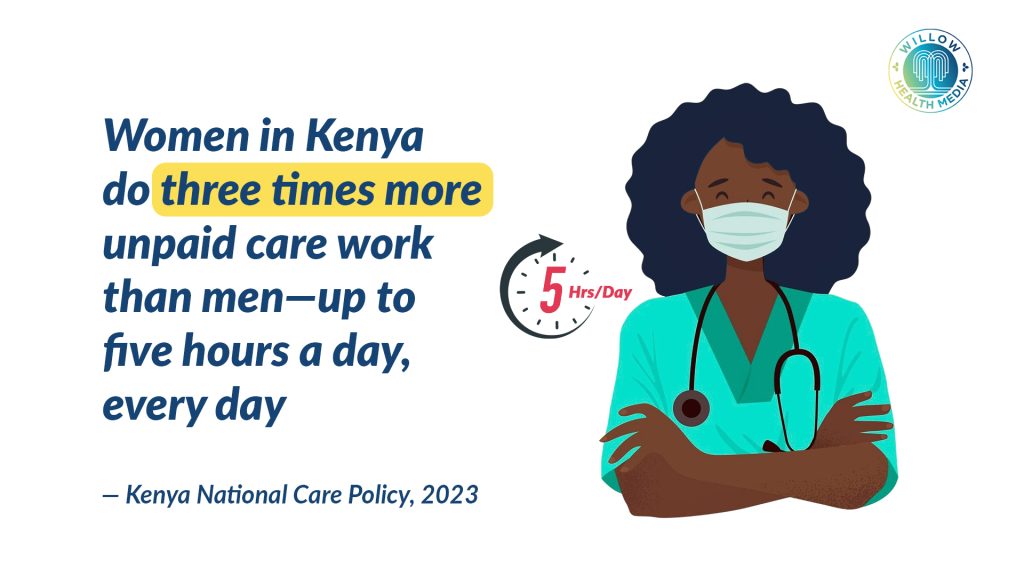
Kenya’s National Care Policy 2023, crafted with UN Women’s support, represents a notable effort to address the country’s care work crisis. However, the policy acknowledges that Kenya has limited regulation of hiring care workers, both locally and for migrants.
To improve its caregiving system, Kenya could adopt elements from Seychelles’ explicit Home Care Agency Act, which comprehensively addresses aspects facilitating provision and access to quality care by qualified caregivers.
As chronic diseases continue to rise and the population ages, developing robust support systems for caregivers is no longer optional but essential for Kenya’s healthcare system to meet the growing needs of its most vulnerable citizens.
Graphics by Brian Wekesa






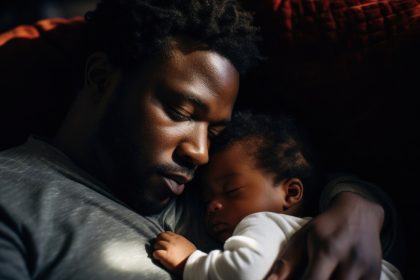


















Very insightful. Hope our hospitals and policy makers would do something to help caregivers.